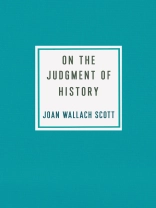In the face of conflict and despair, we often console ourselves by saying that history will be the judge. Today’s oppressors may escape being held responsible for their crimes, but the future will condemn them. Those who stand up for progressive values are on the right side of history. As ideas once condemned to the dustbin of history—white supremacy, hypernationalism, even fascism—return to the world, threatening democratic institutions and values, can we still hold out hope that history will render its verdict?
Joan Wallach Scott critically examines the belief that history will redeem us, revealing the implicit politics of appeals to the judgment of history. She argues that the notion of a linear, ever-improving direction of history hides the persistence of power structures and hinders the pursuit of alternative futures. This vision of necessary progress perpetuates the assumption that the nation-state is the culmination of history and the ultimate source for rectifying injustice. Scott considers the Nuremberg Tribunal and South Africa’s Truth and Reconciliation Commission, which claimed to carry out history’s judgment on Nazism and apartheid, and contrasts them with the movement for reparations for slavery in the United States. Advocates for reparations call into question a national history that has long ignored enslavement and its racist legacies. Only by this kind of critical questioning of the place of the nation-state as the final source of history’s judgment, this book shows, can we open up room for radically different conceptions of justice.
Innehållsförteckning
Preface: History, Race, Nation
1. The Nation- State as the Telos of History: Nuremberg, 1946
2. The Limits of Forgiveness: South Africa’s Truth and Reconciliation Commission, 1996
3. Calling History to Account: The Movement for Reparations for Slavery in the United States
Epilogue: Revisioning History
Acknowledgments
Notes
Index
Om författaren
Joan Wallach Scott is professor emerita in the School of Social Science at the Institute for Advanced Study in Princeton, NJ. Her Columbia University Press books include
Gender and the Politics of History, thirtieth anniversary edition (2018), and
Knowledge, Power, and Academic Freedom (2019).












